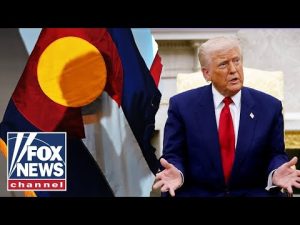**Trump’s Relentless Push for Peace with Iran: No Nukes, No Wars**
In a world fraught with nuclear tensions and complex geopolitical landscapes, the spotlight is back on former President Donald Trump and his passionate stance towards Iran. Recently, he has been engaging in crucial dialogue, aimed at ensuring that Iran does not develop nuclear weapons. To many Americans, this issue is a hard stop—a non-negotiable. Iran, with its longstanding ambitions, poses a significant threat not only to the United States but to global peace as well. However, the approach to handling this situation is where opinions start to diverge.
From the moment Trump took office, his clear message has been that while America will not allow Iran to obtain nuclear capabilities, it is vital to approach this issue with caution and strategy. The idea of military intervention is fraught with potential disaster, and many conservative voices are echoing the sentiment that war with Iran would be nothing short of catastrophic. The reality is that the nation’s leaders must deftly navigate the waters of diplomacy rather than resorting to the blunt instruments of military might.
It’s crucial to remember that negotiations, when done effectively, can lead to favorable outcomes. While certain senators and members of the political elite may advocate for more aggressive measures, there is a growing understanding that talking things through is not just a preferable alternative but a necessary one. The stakes are high, and as the drums of war echo through Washington, a chorus for peace and diplomacy emerges louder than ever. The sentiment is clear: there’s a collective desire to resolve the situation without losing sight of the catastrophic consequences that war could bring.
Among the brightest rays of hope in this discourse is the genuine potential of the Iranian people. Many young Persians, who are yearning for a democratic society, resonate with freedom-loving Americans on platforms like TikTok—sharing their stories and aspirations. It’s a reminder that behind the political tensions lie real lives and dreams, which could flourish in an environment free from tyranny. This human element underscores the importance of finding a path to peace, allowing for the possibility that change can come from within Iran, rather than through external military pressure.
In conclusion, Trump’s commitment to a peace-oriented dialogue with Iran is a strategic move that aligns with both patriotic values and the desire for global stability. By advocating for negotiations while firmly opposing war, he embodies a vision that prioritizes diplomacy over destruction. And while the political winds may shift and change, the call for peace and prudence remains a critical message that resonates with many Americans. Investing in dialogues, rather than destructive war agendas, could very well be the key to unlocking a brighter, more peaceful future for both the U.S. and the world at large. Now, if only Washington could hear that message loud and clear!







